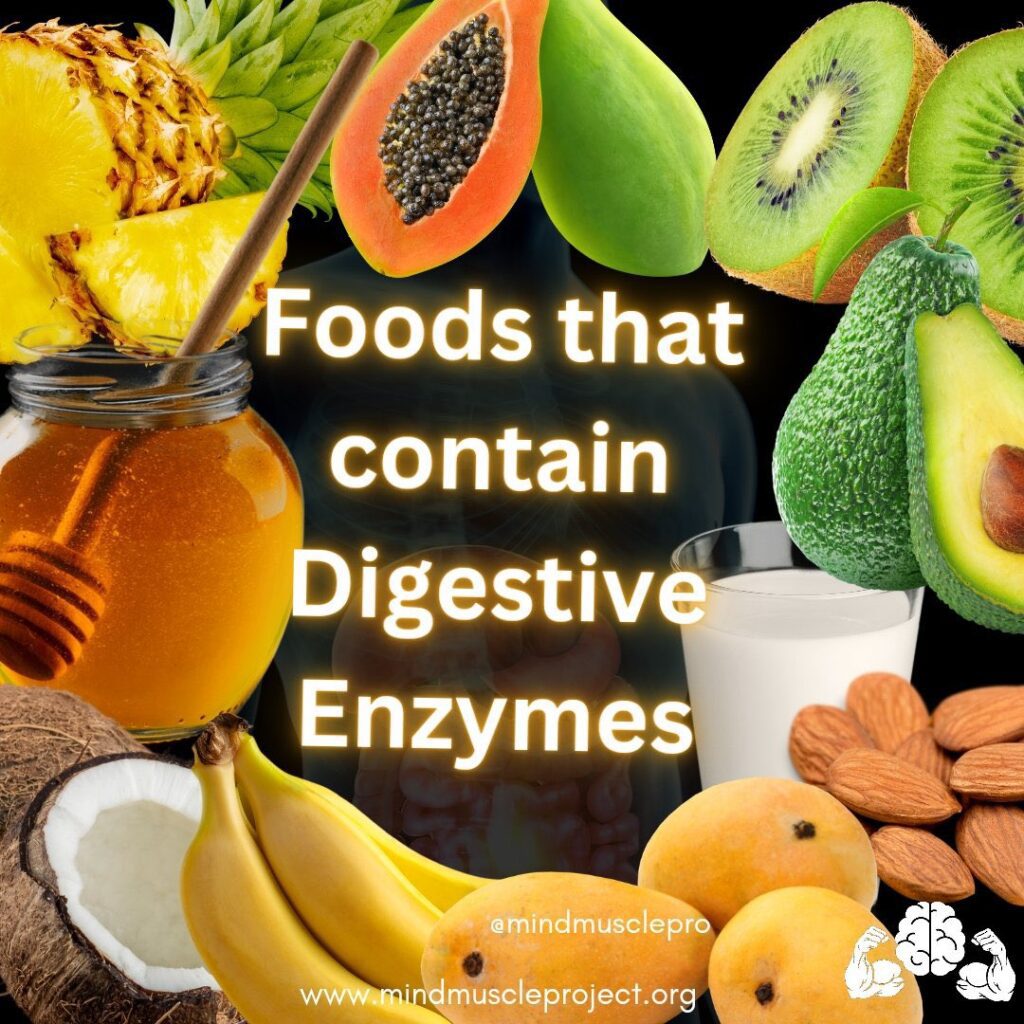Our digestive system works tirelessly to break down the food we eat into nutrients that fuel our body. At the core of this process are digestive enzymes, specialized proteins that break down food into simpler forms, making them easier to absorb.
Understanding the role of these enzymes and how certain foods can naturally aid digestion is a game-changer for gut health. Let’s explore the three main types of digestive enzymes, the foods that contain them, and how to optimize your diet for better digestion.
The 3 Main Types of Digestive Enzymes #
- Proteases: Break down proteins into amino acids.
- Lipases: Break down fats into fatty acids and glycerol.
- Amylases: Break down carbohydrates into simpler sugars.
Each enzyme plays a unique role in the digestive process, ensuring that the food you eat is converted into nutrients your body can use.
Foods That Contain Natural Digestive Enzymes #
Nature provides us with foods rich in their own enzymes, which can aid digestion and reduce the workload on our digestive system. Here’s a breakdown of foods that supply each type of enzyme:
Protease-Rich Foods (Break Down Proteins) #
These foods help digest proteins into smaller amino acids, reducing the strain on your stomach.
- Pineapple
: Contains bromelain, a protease enzyme that aids in breaking down protein.
- Papaya: Packed with papain, a powerful protease enzyme often used to tenderize meat.
- Kiwi
: Contains actinidain, a natural protease enzyme that aids digestion.
- Ginger
: Contains zingibain, a protease enzyme that supports protein breakdown and improves digestion.
Lipase-Rich Foods (Break Down Fats) #
Lipase enzymes break down fats into fatty acids and glycerol, making them easier to absorb.
- Avocado
: Rich in a pancreatic lipase-type enzyme that helps digest fats.
- Coconut
: Contains gastric lipase, aiding in the digestion of dietary fats.
- Raw Nuts
: A natural source of gastric lipase, promoting fat digestion.
- Raw Dairy Products
: Contain bovine milk lipase, though pasteurization can significantly reduce its effectiveness.
Amylase-Rich Foods (Break Down Carbohydrates) #
Amylase enzymes simplify carbs into sugars, making them easier to digest.
- Bananas
: Contain ptyalin, a salivary amylase that begins carbohydrate digestion.
- Mangoes
: Packed with amylase enzymes that break starches into sugars, giving them their sweet taste.
- Sprouted Grains
: Sprouted wheat and barley contain salivary amylase (ptyalin), enhancing carb digestion.
The All-Rounder: Foods Containing All 3 Enzymes #
Some foods, like raw honey 
Tips for Better Digestion with Enzyme-Rich Foods #
- Marinate Meat with Papaya or Pineapple
- The enzymes in papaya (papain) and pineapple (bromelain) tenderize meat and make it easier to digest.
- Incorporate Raw Foods
- Enzymes in raw foods are often destroyed during cooking. Including raw nuts, dairy, or sprouted grains can improve digestion.
- Balance Your Diet
- Combine enzyme-rich foods with balanced meals to ease the digestive process and reduce bloating or discomfort.
- Be Mindful of Food Processing
- Pasteurization and heavy processing often destroy natural enzymes in foods like dairy. Opt for raw or minimally processed options when possible.
Final Thoughts #
Digestive enzymes are the unsung heroes of gut health. By including enzyme-rich foods in your diet, you can naturally support your digestive system, reduce bloating, and improve nutrient absorption. Whether it’s enjoying a slice of pineapple after a protein-rich meal or adding sprouted grains to your breakfast, small dietary changes can make a big difference in how you feel.
Boost your digestion naturally—your gut will thank you!





